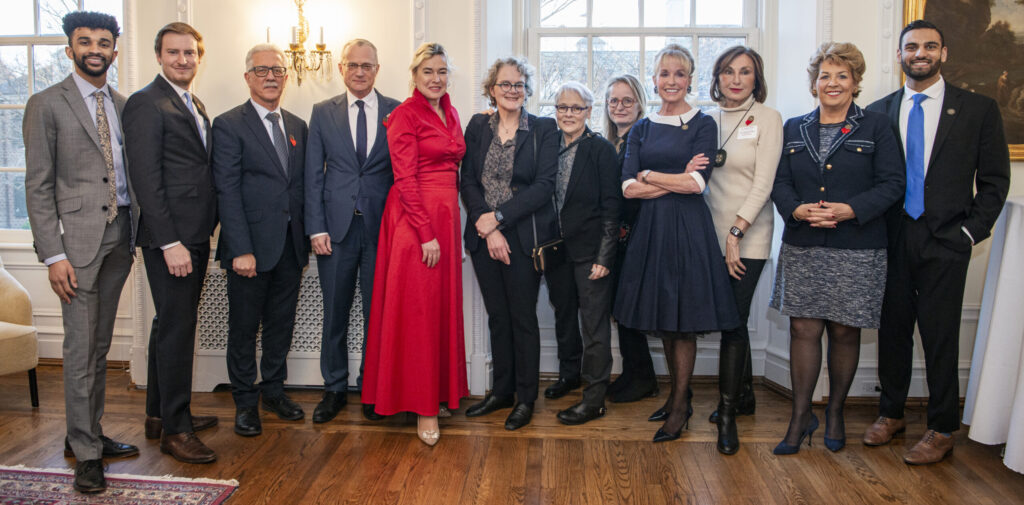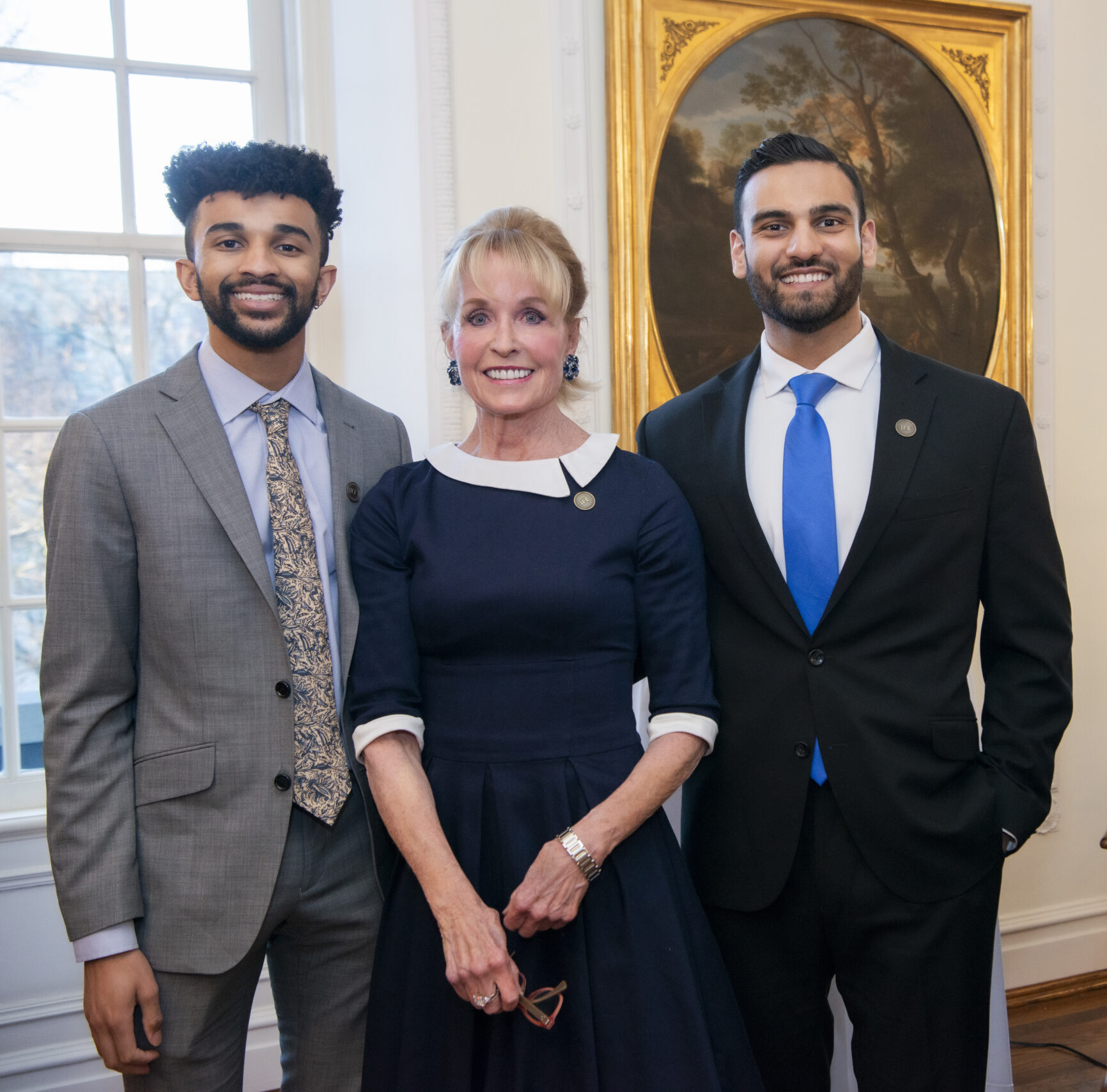
TechBio, an engineering- and technology-first approach to science and medicine and their application to biosecurity, was front and center at the Institute for Education’s (IFE) most recent Salon at the beautiful residence of the Austrian Ambassador to the U.S., H.E. Dr. Petra Schneebauer.
Gathering an interdisciplinary audience spanning across academia, industry, and both domestic and international governments, the Salon featured the new Director of the National Institutes of Allergy and Infectious Disease (NIAID), Dr. Jeanne Marrazzo, who assumed this position in Fall 2023.
Kicking off the evening, Ambassador Schneebauer delivered remarks on the state of TechBio in Austria—investing almost 300 million euros in research and development every year, Austria is home to over 150 TechBio companies that employ more than 2,300 employees. She highlighted Austria’s active role in training the next generation of TechBio leaders. Austria prioritizes recruitment of stellar STEM students to its most prestigious academic institutions, thereby paving the way for TechBio’s future in Austria.
IFE CEO Coach Kathy Kemper then thanked Ambassador Schneebauer for her TechBio leadership and warm hospitality before welcoming everyone to IFE’s D.C. TechBio kickoff, which included Ambassadors: H.E. Godfrey Carmel Xuereb of Malta, H.E. Marek Magierowski of Poland, H.E. Nicole Bintner-Bakshian of Luxembourg, H E. Maguy Maccario Doyle of Monaco, and H.E. Geraldine Byrne Nason of Ireland. She also introduced IFE’s newest TechBio Program, founded by the inaugural Jim Valentine TechBio Fellow, Omair M. Khan, an MD-PhD student at Stanford University whose research is in stem cell biology and regenerative medicine.
Khan introduced the crowd to the field of TechBio as a whole, its history since conception in Silicon Valley to present, and how its poised to shift fundamentally the paradigm of modern science and medicine. He drew stark comparisons between traditional biotech and the fast-developing field of TechBio and related the stories of artificial intelligence and machine learning-enabled medical devices and the future reality of personalized medicine for every patient in the world as a few examples of revolutionary TechBio innovations, before welcoming to the podium Dr. Jo Hoffman, an infectious disease physician and Director Marrazzo’s spouse.
As is tradition at IFE, Director Marrazzo was introduced by her partner, Dr. Jo Hoffman, who delivered a beautiful ode to the story of how Marazzo and Hoffman first met, before delivering an impressive summary of Dr. Marrazzo’s pioneering infectious disease career across many prestigious institutions, culminating in her current role as Director of NIAID.
Following introductions, Jeremiah N. Sims, a Jim Valentine TechBio Fellow and MD-PhD student researching computational protein design at the University of Washington, began a lively fireside chat with Dr. Marrazzo. He opened with a question on how the role of Director, one which had become highly politicized during the pandemic, has evolved since she took the helm. As this was one of Dr. Marrazzo’s first public events as Director, she highlighted how she plans to address the challenges of biosecurity while providing transparency and public accountability. Sims and Marrazzo chatted about the power of cutting-edge artificial intelligence and machine learning (AI/ML) software to accelerate vaccine and therapeutic development pipelines, ushering in an era of rapid response to biosecurity threats with potent, intelligently designed medical countermeasures. The enthusiasm in this technology was also balanced by a healthy introspection of how TechBio can facilitate partnerships between public and private sectors, with the promise of repairing diplomatic relationships that were left damaged in the wake of COVID-19. Sims and Marrazzo wrapped up by discussing AI stewardship: what is our responsibility as scientists, innovators, thought leaders, and policy makers in ensuring that these technologies do not fall into the wrong hands? Dr. Marrazzo offered a sobering reminder that rapid innovation and open sourcing can carry an inherent risk, but that the pipeline of science has many steps, and at each step, we have already begun to implement safety checks to mitigate improper use and to maximize the opportunity of the TechBio revolution.
An animated Q&A session was followed by a lovely reception featuring delicious Austrian hors d’oeuvres and wine. As the evening came to a close, guests were gifted stunning Swarovski crystal tea candle holders and sumptuous chocolate, both Austria’s own. Indeed, the early Spring evening will surely be remembered as a groundbreaking moment for ushering in a new wave in modern medicine, advanced in part by productive collaboration between public and private sectors with IFE’s steadfast leadership.
View: Event Photos | IFE TechBio Program
SPOTTED: H.E. Dr. Petra Schneebauer (Austria), Coach Kemper, NIH/NIAID Director Dr. Jeanne Marrazzo, Dr. R. David Edelman, H.E. Dr Godfrey Carmel Xuereb (Malta), H.E. Marek Magierowski (Poland), Dr. Jo Hofmann, H.E. Nicole Bintner-Bakshian (Luxembourg), H.E. Maguy Maccario Doyle (Monaco), H.E. Geraldine Byrne Nason (Ireland), White House Innovation Fellows Pater Marks, Alex Glade, Varoon Mathers, and the James Valentine TechBio Fellows Omair M. Khan and Jeremiah Sims.
